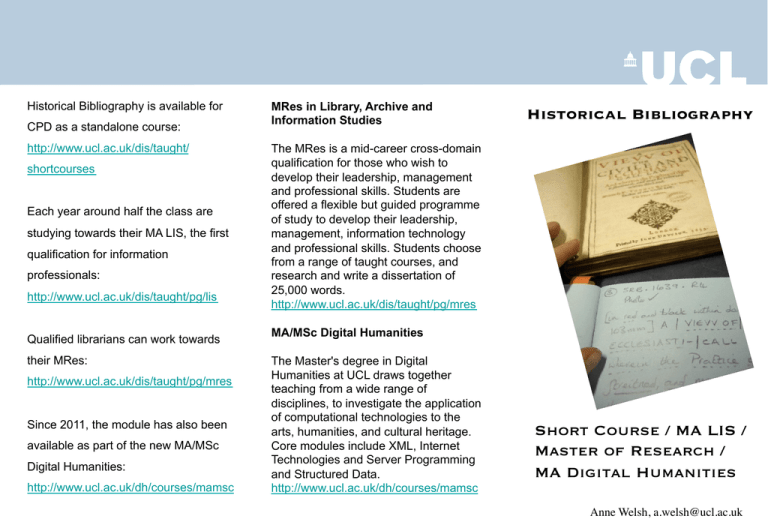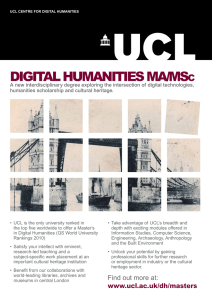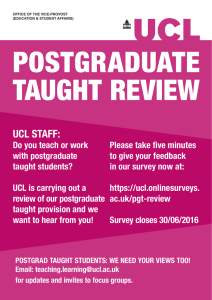Historical Bibliography
advertisement

Historical Bibliography is available for CPD as a standalone course: http://www.ucl.ac.uk/dis/taught/ shortcourses Each year around half the class are studying towards their MA LIS, the first qualification for information professionals: http://www.ucl.ac.uk/dis/taught/pg/lis Qualified librarians can work towards their MRes: http://www.ucl.ac.uk/dis/taught/pg/mres Since 2011, the module has also been available as part of the new MA/MSc Digital Humanities: http://www.ucl.ac.uk/dh/courses/mamsc MRes in Library, Archive and Information Studies Historical Bibliography The MRes is a mid-career cross-domain qualification for those who wish to develop their leadership, management and professional skills. Students are offered a flexible but guided programme of study to develop their leadership, management, information technology and professional skills. Students choose from a range of taught courses, and research and write a dissertation of 25,000 words. http://www.ucl.ac.uk/dis/taught/pg/mres MA/MSc Digital Humanities The Master's degree in Digital Humanities at UCL draws together teaching from a wide range of disciplines, to investigate the application of computational technologies to the arts, humanities, and cultural heritage. Core modules include XML, Internet Technologies and Server Programming and Structured Data. http://www.ucl.ac.uk/dh/courses/mamsc Short Course / MA LIS / Master of Research / MA Digital Humanities Anne Welsh, a.welsh@ucl.ac.uk Historical Bibliography is a ten-week Teaching is delivered by a team module taught on Monday afternoons including Anne Welsh (module in the Autumn term (October – coordinator), Frederick Bearman, December). Genny Grim and Joanne Maddocks. It provides an overview of Western The course is supported by UCL Book History, from the development of Library Special Collections and two the codex to the 21st century, with an thirds of class time involves hands-on emphasis on the printed book. Lectures cover significant developments in History of the Book, Bibliography as a Practical workshops include rare books handling; identification of watermarks, bindings and print techniques; quasi facsimile; foliation subject discipline, and research techniques including provenance, readership studies, authorship studies and textual analysis. and collation; bibliographic description and an introduction to rare books cataloguing (DCRMB). Classes give an introduction to practical skills for new rare books professionals. work with rare books.



